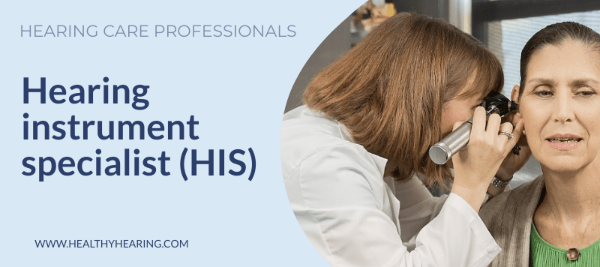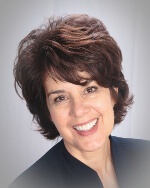|
www.HealthyHearing.com |
What is a hearing instrument specialist?
Contributed by Debbie Clason, staff writer, Healthy Hearing, and Emily Ostrowski, content manager, Healthy Hearing If you or a loved one have been experiencing difficulty hearing you may be wondering who to call to get checked out. Among the qualified hearing care professionals in your area, you are likely to find some who are referred to as hearing instrument specialists. Let's take a closer look at what that means and how their job differs from an audiologist. What does a hearing instrument specialist do?A hearing instrument specialist (HIS) is a state-licensed hearing care professional who has been trained to evaluate common types of hearing loss in adults, as well as dispense hearing aids. Every state licenses hearing instrument specialists. In some states, they are also known as hearing aid dispensers, hearing aid dealers or hearing instrument dealers. Hearing instrument specialists typically use the initials HIS after their name, or in some cases, HAD or other initials depending on their state.
People with a hearing instrument specialist license can:
Is a hearing instrument specialist right for me?As in any profession, there are variations in the skill level, experience and expertise of hearing instrument specialists. If you’re an adult with common age-related hearing loss or noise-induced hearing loss that cannot be corrected medically, a hearing instrument specialist may be the right professional to help you hear better with hearing aids. If your hearing loss is more complex or you have additional needs, a licensed audiologist may the better choice for you. What is the difference between a hearing instrument specialist and an audiologist?Education and scope of service are the two major differences between audiologists and hearing instrument specialists. While hearing instrument specialists are trained to administer hearing evaluations and to fit hearing aids, audiologists are trained to perform full diagnostic evaluations of the auditory system from the outer ear to the brain. Additionally, audiologists often work closely with otolaryngologists (ENTs) to diagnose and treat complex hearing problems. To become an audiologist in the United States today, a person must earn a Doctorate in Audiology (AuD), and become licensed by the state they are practicing in. Audiologists are authorized to work with infants, children, adults, the elderly and patients with special needs. Becoming a hearing instrument specialistEducational requirementsHearing instrument specialists’ educational requirements are less than audiologists’ requirements and vary by state. At a minimum, hearing instrument specialists must have a high school diploma and complete a rigorous training program. Most of these training programs combine classroom or distance learning with a requisite number of hours of hands-on experience supervised by licensed hearing care professionals. These programs can take up to two years. The required program of study for hearing instrument specialists includes, but is not limited to;
Licensure processWhen hearing instrument specialist candidates have successfully completed their training program, they must then pass an exam to become licensed. The testing combines both written and practical examinations judged by a board of examiners. After they pass the examination process, hearing instrument specialist candidates must then apply for licensure from their state. That process includes a background check. To maintain their required professional licensure and stay current with developing changes in the hearing care industry, hearing instrument specialists are required to complete a minimum number of semi-annual continuing education hours. Becoming a board certified hearing instrument specialistAfter a hearing instrument specialist has been licensed and practicing for at least two years, they become eligible to apply for board certification in hearing instrument sciences. The board certification process includes passing a psychometric exam developed by the National Board for Certification in Hearing Instrument Sciences Exam Committee. Hearing instrument specialists who are board certified use the NBC-HIS designation after their names. Where do hearing instrument specialists typically work?Hearing instrument specialists often work for hearing clinics, healthcare organizations like hospitals and ENT practices, or hearing aid manufacturers. They may also own their own hearing care practices. Find help for your hearing lossIf you need a hearing healthcare professional, don’t delay. Many clinics employ both hearing instrument specialists and audiologists working together as a team to find solutions that meet your individual needs. Our online directory can help you find a qualified hearing care provider near you. Debbie Clason, staff writer, Healthy Hearing
Emily Ostrowski, content manager, Healthy Hearing
|
Featured clinics near me
Hearing Health Solutions from Ohio ENT - Columbus
974 Bethel Rd Ste B
Columbus, OH 43214
Earzlink Hearing Care - Reynoldsburg
7668 Slate Ridge Blvd
Reynoldsburg, OH 43068

Find a clinic
We have more hearing clinic reviews than any other site!



 Debbie Clason holds a master's degree from Indiana University. Her impressive client list includes financial institutions, real estate developers, physicians, pharmacists and nonprofit organizations.
Debbie Clason holds a master's degree from Indiana University. Her impressive client list includes financial institutions, real estate developers, physicians, pharmacists and nonprofit organizations.
 Emily is an experienced journalist and medical content writer based in Maine. Passionate about delivering enlightening and accurate content, she is committed to empowering people to make informed choices regarding their hearing health.
Emily is an experienced journalist and medical content writer based in Maine. Passionate about delivering enlightening and accurate content, she is committed to empowering people to make informed choices regarding their hearing health.